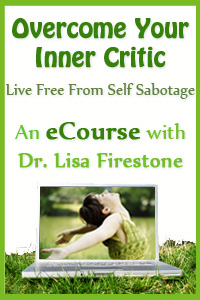The Critical Inner Voice Defined
 The following interview with Dr. Lisa Firestone was conducted by BestofYouToday.com, a website focused on providing insightful articles and information to promote conscious healthy living.
The following interview with Dr. Lisa Firestone was conducted by BestofYouToday.com, a website focused on providing insightful articles and information to promote conscious healthy living.
BOYT: What motivated you to write Conquer Your Critical Inner Voice with your father, Dr. Robert W. Firestone, and Joyce Catlett?
Dr. Lisa Firestone: After years of therapy practice, we could see how much our patientsgained from a deeper understanding of their critical inner voice, and we wanted to make it available to the general public.
The goal is to help individuals gain an awareness of the critical inner voice that causes us to fall short of our capabilities and prevents us from living the life we want to live. Conquer Your Critical Inner Voice offers a means by which readers can free themselves from the harmful effects of this destructive inner process. We developed Conquer while simultaneously conceptualizing the founding principles behind Psychalive.org, sister website to The Glendon Association. PsychAlive is a multi-media website introducing psychological principles for everyday life and encouraging people of all ages to take an active, introspective approach to their lives.
BOYT: Where do our critical inner voices come from? Why do they seem so powerful?
Dr. Lisa Firestone: Our critical inner voices are embedded in our earliest childhood experiences and are reinforced throughout childhood, adolescence, and into adulthood. While the negative inner voice can be affected and sometimes worsened by current day life experiences such as significant trauma or abusive relationships, it does not develop suddenly in adults; it’s based on implicit memories of trauma experienced in childhood. This isn’t necessarily “Big T Trauma” such as sexual or physical abuse, but everyday trauma that kids experience growing up.
Children are extremely perceptive and aware of their parents’ feelings toward them, as well as their parents’ feelings toward themselves. Most core negative beliefs get passed from one generation to the next, simply because parents unknowingly pass on the negative beliefs they have toward themselves onto their children. As adults, we must fully experience and understand the pain of our own childhood in order to prevent passing this pain on to our children.
The negative inner voice we experience as an adult is a direct result of the defenses we developed as children in order to cope with stressful or painful events. As children, these defenses provide protection against the emotional pain we experienced in our families, but as adults these defense will actually limit us, and prevent us from developing to our true potential.
Watch a Whiteboard Video on The Critical Inner Voice
BOYT: Does our critical inner voice serve a good purpose?
Dr. Lisa Firestone: No.A lot of people might mistake their critical inner voice with their conscience. The critical inner voice is not a conscience or a moral guide. Even though the “voice” may sometimes seem to be related to our values and ideals, its statements against us have a degrading and punishing tone that promotes self-hatred. Challenging the internal critic can be extremely difficult for this reason. The “voice” acts as a filter, making negative interpretations of present day events based in negative experiences that occurred in the past.
For example, if a hunting lion pounces at zebra but misses, the lion doesn’t mope around thinking about what an awful lion he is; he moves to another water hole because he still has to eat to survive. If the lion were to listen to his critical inner voice he would never get any food and would eventually die. It’s the same with humans; even if a criticism is true about you, it is never appropriate to be nasty or degrading toward yourself. If there’s something you don’t like about yourself, it should interest you and motivate you to change it. Becoming familiar with every aspect of the critical inner voice will help you align your actions with your goals in life.
BOYT: How do you tell the difference between a critical inner voice and a truthful voice that says something you really should face up to?
Dr. Lisa Firestone: Constructive, positive feelings toward oneself will include attitudes of curiosity, openness, acceptance, and love. It’s always good to be open and honest with ourselves, but we want to stay away from negative, nasty inner thoughts that are maladaptive. The critical inner voice can seem seductively positive at times and can often be self-sabotaging. This self-protective inner voice warning you to take caution (“Don’t let anyone get too close to you, or you’re going to get hurt again”), only prevents you from achieving what you truly want in life, such as a meaningful relationship. The real you is the undefended part of your personality, the unique qualities we possess such as physical attributes or ability, temperament, certain dispositions, and a natural identification with the positive traits our caregivers possessed. We are much more adaptive as individuals if we can separate ourselves from these critical inner voices and become who we truly are.
BOYT: You have said many of us are plagued with this inner voice to the point that our entire lives are influences by it and we may not even recognize this. Can you give us some examples of how this negative inner voice can influence a person’s life?
Dr. Lisa Firestone: It’s important to remember that the critical inner voice is the language of the defended, negative side of your personality, the side that is opposed to your ongoing personal development. Feelings of self-doubt or feelings of inadequacy can prevent a person from pursuing the career they really want or performing at their highest potential. An individual may also sabotage themselves with self-destructive behaviors like addiction.
Your critical inner voice can be subconsciously causing you to do the very things you’re trying to overcome. This negative inner voice can interfere with work and relationships, and can even lead to depression and anxiety disorders. In the most severe cases, the critical inner voice can drive an individual to commit violent behavior or suicide. These destructive thoughts and attitudes can become so intense they begin to take precedence over our realistic or more positive ways of thinking.
BOYT: In your book you discuss how to go about rising above your critical inner voice. Please give us an overview of the process.
Dr. Lisa Firestone: All of us are divided within ourselves and have a basic conflict in relation to our goals and aspirations in life. While most people are conscious of some aspects of their inner voice, many negative thoughts exist on an unconscious level. The first step is to identify your critical inner voice and then, to differentiate yourself from that negative inner voice. A journal can be an effective tool in identifying and challenging your critical inner voice. Write down how you feel throughout the day and the circumstances that caused you to feel this way.
The next step is to separate yourself from your critical inner voice. Understand where it comes from and allow yourself to be aware of its causes. Once we understand where these voices come from, we can identify what they are preventing us from achieving. The next step is to make a plan of action. Challenging the critical inner voice is going to be uncomfortable and it’s going to bring up a lot of anxiety at first. The voice will get louder as you begin to fight against it, almost like a parent yelling at their child to get back in line, but it’s important to remember to put distance between the negative thoughts and the corresponding bad behavior. The critical inner voice is like an internal monster that grows stronger each time you feed into it. By distancing yourself from the voice, you can begin to starve the monster, and the anxiety will eventually decrease.
BOYT: When someone has identified their destructive inner voice, is it usually easy to figure out where and why that voice exists? Is the answer not always the one that a person feels it obvious?
Dr. Lisa Firestone: An individual’s destructive inner voice most commonly originates in early childhood. As infants, in the process of bonding with our parents, we absorb and take in their attitudes toward us. These internalized antagonistic attitudes form the basis of the critical inner voice. One can identify the origin of the voice by recounting and understanding the trauma of one’s childhood. When parents have unresolved feelings from either trauma or loss in their past, these feelings will impact their reactions to their children.
A lot of times children embody unresolved issues from their parents’ past into their own current day lives without even recognizing it. We can stop this cycle by addressing unresolved issues in our own past and allowing ourselves not only to fully feel the pain of childhood trauma, but also understand it.
BOYT: Is it hard to get rid of our critical inner voice? If so why is that? Is it possible to get rid of it entirely?
Dr. Lisa Firestone: It’s extremely difficult to break free of, but we can control it, recognize it for what it is, and prevent it from spiraling out of control. Does this mean you’ll never have another self-critical thought again? Of course not, but we can do our best by first recognizing the critical inner voice and separating it from our own.
BOYT: For the parents among our readers, can we raise our children in a way that will protect them from their critical inner voice?
Dr. Lisa Firestone: Children learn to parent themselves at a young age as a means of survival, treating themselves in much the same way they are treated by their parents—both soothing and punishing themselves. By engaging in behavior that makes children independent, you will allow them to differentiate themselves as individuals rather than extensions of you.
As parents, we should always be aware of our own preconceived ideas for our children. Are we really interested in getting to know who they are as individuals? Repair mistakes you make with your child, because even perfect parents don’t get it right all the time. Addressing a mistake you made with your child will allow them to be more accepting of their own mistakes, and will help to prevent unresolved trauma from carrying into adulthood.
The next time you notice yourself struggling with your child, identify the circumstances that are making you so upset. The most important thing to remember is that you can’t do for your child what you think you needed as a child. Your children are not you; they are their own unique beings that need constant love, care, and attunement. Children depend on the love and support of a social structure and will always adapt to their situation in self-protective ways. Letting your children talk to you about their critical inner voice will allow you as a parent to identify the mind behind your child’s behavior. By talking to your kids about their own critical inner voice, you can help them recognize when they are attacking themselves and prevent those ideas from affecting them in the future.

Tags: awareness, BestofYouToday.com, Conquer your Critical Inner Voice, critical inner voice, Early development, negative thought processes, parent love, PsychAlive, self-destructive behavior, self-sabotage, trauma









Interesting